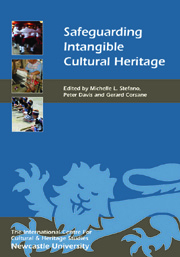Book contents
- Frontmatter
- Contents
- List of Illustrations
- Acknowledgments
- Touching the Intangible: An Introduction
- NEGOTIATING AND VALUING THE INTANGIBLE
- APPLYING THE INTANGIBLE CULTURAL HERITAGE CONCEPT
- 8 Reflections on the Implementation of the UNESCO 2003 Convention for the Safeguarding of Intangible Cultural Heritage in France
- 9 Government and Intangible Heritage in Australia
- 10 Proud to be Dutch? Intangible Heritage and National Identity in the Netherlands
- 11 Intangible Cultural Heritage in Wales
- 12 Conversation Piece: Intangible Cultural Heritage in Botswana
- 13 The UNESCO Convention for the Safeguarding of Intangible Cultural Heritage and its Implications for Sustaining Culture in Nova Scotia
- ON THE GROUND: SAFEGUARDING THE INTANGIBLE
- List of Contributors
- Index
12 - Conversation Piece: Intangible Cultural Heritage in Botswana
from APPLYING THE INTANGIBLE CULTURAL HERITAGE CONCEPT
Published online by Cambridge University Press: 05 February 2013
- Frontmatter
- Contents
- List of Illustrations
- Acknowledgments
- Touching the Intangible: An Introduction
- NEGOTIATING AND VALUING THE INTANGIBLE
- APPLYING THE INTANGIBLE CULTURAL HERITAGE CONCEPT
- 8 Reflections on the Implementation of the UNESCO 2003 Convention for the Safeguarding of Intangible Cultural Heritage in France
- 9 Government and Intangible Heritage in Australia
- 10 Proud to be Dutch? Intangible Heritage and National Identity in the Netherlands
- 11 Intangible Cultural Heritage in Wales
- 12 Conversation Piece: Intangible Cultural Heritage in Botswana
- 13 The UNESCO Convention for the Safeguarding of Intangible Cultural Heritage and its Implications for Sustaining Culture in Nova Scotia
- ON THE GROUND: SAFEGUARDING THE INTANGIBLE
- List of Contributors
- Index
Summary
Can you say something about yourself and your personal/professional interest in ICH?
I am currently a research scholar in cultural heritage tourism at the University of Botswana's Okavango Research Institute, Botswana. My interest in ICH spanned from my doctoral thesis, which was largely inspired by my disciplinary background in Archaeology and Environmental Sciences and Heritage and Museum Studies. Most of my archaeology (and consequently heritage) background tended to focus on tangible structures and, as I journeyed through my PhD thesis, it became apparent that, in order to achieve sustainable development in African cultural heritage management, a focus on both tangible and intangible aspects of heritage was inevitable. Since then, I have been publishing and researching on the subject of ICH in Botswana. More recently, UNESCO's intangible heritage section requested that I become an examiner for some of their applications for funding by African countries. I have also been involved as a consultant with a community-based intangible heritage inventorying project funded by the Flanders government through UNESCO.
Were there policies already in place in Botswana that have dealt with intangibles before UNESCO's 2003 Convention?
No, not specifically tailored and targeted to ICH management in its entirety. There exists, however, scattered practices that have always been biased towards intangible heritage associated with performing arts rather than the broader context of ICH. This is still the case, but I hope that since Botswana is one of the six sub-Saharan countries involved in the UNESCO pilot projects on community-based ICH inventorying, the situation may be different in the next few years.
- Type
- Chapter
- Information
- Safeguarding Intangible Cultural Heritage , pp. 149 - 152Publisher: Boydell & BrewerPrint publication year: 2012



